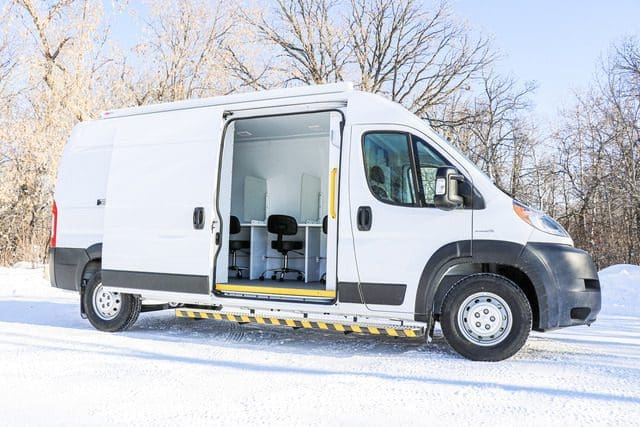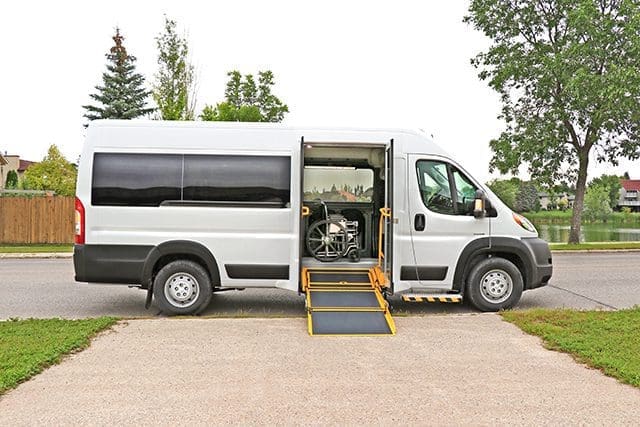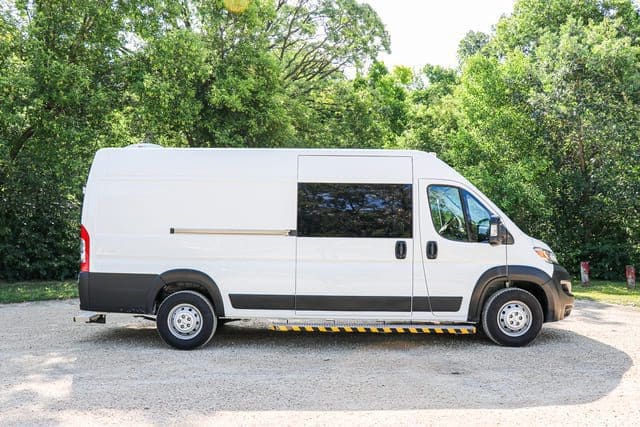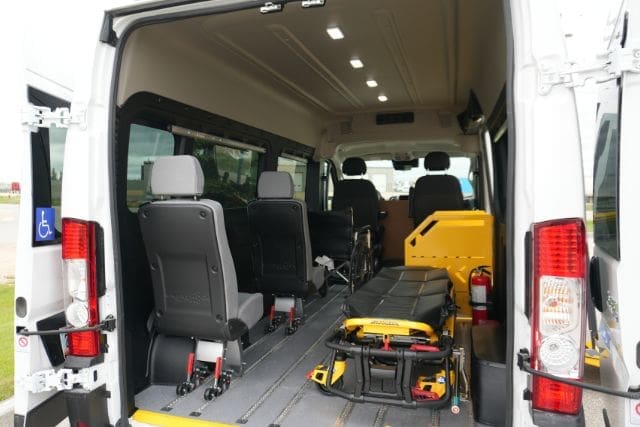Does your organization currently provide substance abuse counselling in a fixed, brick-and-mortar clinic?
Or, maybe you haven’t yet started mobile substance abuse counselling services yet and you’re still in the research stage of things.
Unfortunately, stigma and judgment from others can prevent people dealing with substance abuse concerns from making it to your clinic to get the help they need. Reliable transportation is another hurdle that prevents people from getting to traditional clinics.
Around 21% of Canadians deal with some sort of substance abuse issues at some point during their lives.
At MoveMobility, we don’t like seeing barriers blocking the way of people getting the help they need. That’s why we’ve been manufacturing four different types of mobile medical vans for the past decade. Organizations like yours can use one of our vans to help people overcome these hurdles and lead more fulfilling lives.
In this article, you’re going to learn more about substance abuse counselling. You’ll also learn about the Mobile Mitigation Van (also referred to as the Mobile Overdose Prevention Van) and the Mobile Counselling Van and how your team can use these vehicles to reach more people dealing with substance abuse issues.
What is substance abuse counselling?
Substance abuse counselling is like having a guide to help when someone is struggling with using drugs or alcohol too much. It’s a bit like having a coach for the mind and emotions.
Let’s take a look at a few components of substance abuse counselling and what counsellors are.
Talk and support: Counsellors are friendly listeners and expert guides. They talk with people about their challenges and provide support.
Understanding triggers: They help figure out what makes someone use substances and find better ways to handle those situations.
Setting goals: Together, they help to create small, achievable goals. They help people make a step-by-step plan to overcome addiction and get their life back on track.
How does substance abuse counselling work?
Typically, people need to visit a clinic for substance abuse counselling. Here’s a brief glimpse into that:
1. Initial assessment: Individuals meet with counsellors who assess their situation and try to understand the extent of the substance use issue.
2. Personalized plans: Counsellors craft personalized plans for the person struggling.
3. Therapeutic sessions: Regular in-person sessions at the clinic provide a safe space to discuss challenges, emotions, and progress. The sessions can either be on an individual basis or in a group setting.
- One-on-one sessions: People get to chat privately with a counsellor. It’s a safe space to open up and work through struggles.
- Group support: Some substance abuse clinics offer group sessions where people share their experiences. These are useful because they help people understand they’re not alone.
4. Education and coping strategies: Counsellors offer education on addiction and equip individuals with coping strategies for a substance-free life.
In the next section, you’ll learn about some of the barriers that prevent people with substance abuse from seeking help.
What makes going for substance abuse counselling difficult?
For individuals dealing with substance abuse, the journey to a fixed clinic comes with unique challenges. Learn about some of them below.
Transportation troubles
Getting to a brick-and-mortar clinic isn’t always easy. Many people facing substance abuse issues may not have their own vehicle. Dependence on public transport or others for rides introduces even more hurdles.
Time constraints and daily struggles
Life is complicated, especially for those dealing with substance abuse. Daily struggles, such as work commitments or family responsibilities, add another layer of difficulty. Finding the time for clinic visits becomes a challenge and impacts their ability to access the support they need.
Fear of exposure
The fear of others seeing people at a clinic for drug abuse issues can be paralyzing. The worry of being recognized by acquaintances or judgmental eyes may prevent individuals from seeking the necessary help. Stigma and judgment can be tough hurdles to overcome. Others in the clinic might not understand their struggles, and this can lead to discomfort and unease and be a barrier to taking the first step toward recovery.
Financial barriers
Money matters are also a hurdle that prevents people from getting to fixed clinics. Some individuals may face financial constraints. This can make it difficult to afford transportation costs or potential clinic fees. These financial hurdles limit their ability to attend regular ongoing sessions.
Emotional struggles
Dealing with substance abuse is emotionally draining. Anxiety and shame are additional obstacles that make it hard for individuals to gather the courage to walk into a clinic. Overcoming these emotional hurdles is important for them to take the step toward recovery.
Keep reading to learn more about how the Mobile Mitigation Van can be used to overcome these barriers for people seeking substance abuse counselling.
What is the Mobile Mitigation Van?
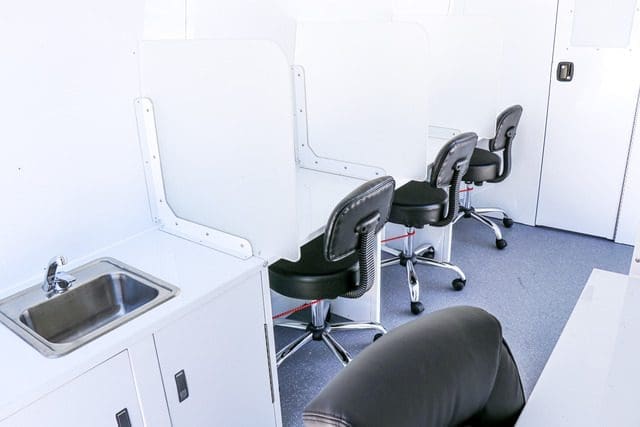
The Mobile Mitigation Van is specially designed to bring support to those facing substance abuse challenges. The biggest bonus of this van is that instead of people having to visit a clinic, the clinic comes to them. This feature in itself single-handedly eliminates transportation and stigma barriers people face with regular clinics.
Let’s take a look at a few other features that make the Mobile Mitigation Van so useful for substance abuse counselling.
Private space: Inside the van, there are three comfortable desk pods. Each spot has chairs, privacy panels, and even plugs for devices.
Office space: There’s office space for social workers to do their paperwork. With this space, they can keep track of goals and create plans for people in the substance abuse program.
Storage: The van has cabinets from the floor to the ceiling. This helps to keep all your supplies organized and easy to find.
Easy-to-clean materials: The surfaces in the van are easy to clean because they’re made from aluminum. This makes sure everything stays sterile and germ-free. It’s all to ensure you have a healthy and safe place for counselling sessions with your clients.
Just the right temperature: No matter if it’s hot or cold outside, the Mobile Mitigation Van keeps a perfect temperature. It has heat and air conditioning in the back. This means you and your clients will be comfortable during your counselling sessions no matter what season it is.
Supervised consumption site: The Mobile Mitigation Van also promotes safety and privacy with clean equipment for injections. It travels around to help people use substances more safely, preventing illnesses and overdoses.
Mobile Mitigation Van example
Cole has been struggling with drug addiction and was nervous about going to a regular clinic for help. He was fearful about being spotted by someone he might know. He also lived in a remote area that was around two hours away from the nearest clinic.
The combination of these things made it hard for Cole to reach out for help. While browsing the internet, he found out about an organization that provided mobile substance abuse counselling in his area. He instantly booked an appointment and when the van arrived in his neighborhood, it was like a breath of fresh air.
There was no one looking around at him as he stepped into the van, and friendly social workers instantly greeted him. After three months of weekly counselling sessions, Cole can proudly say he’s no longer using.
What is the Mobile Counselling Van?
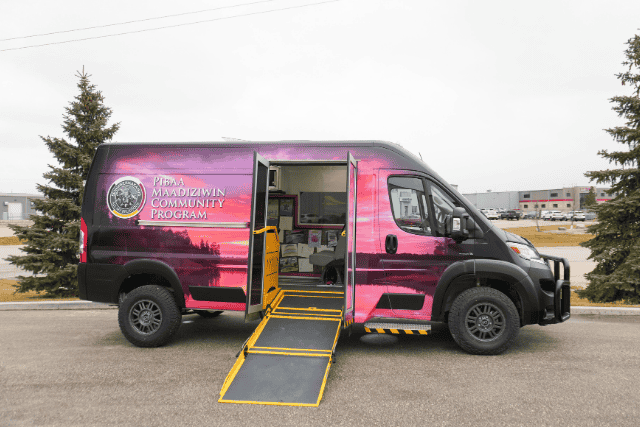
The Mobile Counselling Van is a safe, private space where people can get support right in their own community. Instead of travelling to a clinic, they can meet with a counsellor in a comfortable and confidential setting. This removes big barriers like transportation issues and the fear of being judged.
What features make the Mobile Counselling so good for substance abuse counselling?
A safe and private space: Inside the van, people can talk openly with a counsellor without worrying about others overhearing.
One-on-one or group sessions: Some people prefer private sessions, while others feel better in a small support group. The van offers both options.
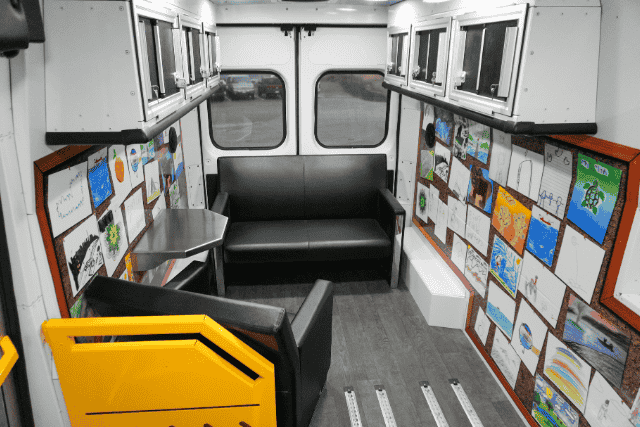
Easier access to help: The van goes where it’s needed, so people don’t have to travel far to get support.
Comfortable and welcoming: With heating and air conditioning, the van is a comfortable place to talk, no matter the season.
People struggling with substance use who feel nervous about going to a clinic can get the support they need in the van. This is especially helpful for those living in rural areas, people without reliable transportation, or anyone worried about the stigma of seeking help.
The Mobile Counselling Van makes it easier for people to reach out, talk to a counsellor, and take steps toward recovery—without extra stress or obstacles.
Your next steps with MoveMobility
You found this article while researching more about substance abuse counselling. If you’ve made it this far, you now know a bit more about it, as well as how you can provide it with the Mobile Mitigation Van.
Our innovative solutions at MoveMobility are all about making it easier for people to receive healthcare. We believe everyone should have equal access to it, and our vehicles are one way to help with that.
If you’ve found this article informative, you’ll also like our article on supervised consumption sites. It takes a closer look at what consumption sites are and how they work.
Lastly, you should also check out our article on the steps to buying a mobile medical van. This article will steer you on the right track to securing one for your organization.


